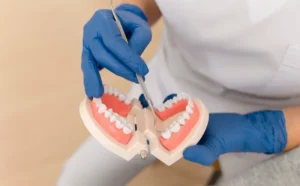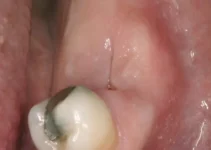Experiencing swelling around a dental implant is a relatively common issue that many patients face. It often occurs due to inflammation in the soft tissues surrounding the implant site, typically resulting from either surgical trauma or an infection known as peri-implantitis. While mild swelling for a few days post-surgery is normal, ongoing or severe swelling might need medical attention. It’s important to follow your dentist’s instructions on oral hygiene, including the use of antiseptic mouthwashes and the correct brushing techniques to reduce the risk of infection and swelling. Keeping a close eye on the symptoms and consulting with your dentist if the condition persists or worsens can ensure your implant’s longevity and prevent further complications.
Causes of Swelling Around Dental Implants
Dental implants have become a common solution for replacing missing teeth, providing both aesthetic and functional benefits. However, one of the potential side effects following the procedure is swelling around the implant area. Understanding the causes of this swelling can help in the early diagnosis and treatment, ensuring the longevity of the implant and the comfort of the patient. The three main causes of swelling around dental implants are infection, poor oral hygiene, and surgical complications.
Infection
One of the most common causes of swelling around dental implants is infection. Infection can occur when bacteria enter the surgical site during or after the procedure, leading to inflammation and swelling. Peri-implantitis is a specific type of infection that affects the tissues surrounding the implant. Symptoms may include redness, swelling, pain, and even pus discharge.
Infections can be caused by several factors, including:
- Poor surgical technique
- Compromised sterilization protocols
- Pre-existing oral infections
Ensuring proper sterilization during surgery and maintaining a sterile environment can greatly reduce the risk of infection.
Poor Oral Hygiene
Poor oral hygiene is another significant factor that can lead to swelling around dental implants. When patients do not adhere to proper oral hygiene practices, plaque and tartar can accumulate around the implant site. This buildup can harbor bacteria that cause inflammation and swelling. Maintaining good oral hygiene is crucial, especially after receiving a dental implant. Patients should be educated on the importance of:
- Brushing twice daily
- Flossing regularly
- Using an antiseptic mouthwash
- Scheduling regular dental check-ups
Consistent oral care can prevent the development of peri-implantitis and other complications that may cause swelling.
Surgical Complications
Surgical complications can also lead to swelling around dental implants. In some cases, the body’s natural response to the surgical procedure itself can cause temporary swelling. However, more severe complications, such as nerve damage, improper implant placement, or excessive force applied during the surgery, can cause prolonged or intense swelling.
To minimize the risk of surgical complications, it is essential that the procedure is performed by a qualified and experienced dental professional. Surgeons should conduct comprehensive pre-operative planning, including the use of imaging techniques like CT scans, to ensure precise implant placement. Additionally, they must follow meticulous surgical protocols and post-operative care instructions to mitigate the risk of complications.
Understanding the causes of swelling around dental implants can greatly aid in the prevention and management of this condition. By recognizing the signs and addressing the underlying issues, patients can enjoy the full benefits of their dental implants without unnecessary discomfort.
For more insights into dental health and advanced treatment options, be sure to explore our other articles and expand your knowledge on maintaining a healthy and radiant smile.
Symptoms of Dental Implant Swelling
Dental implants have revolutionized the way we approach tooth restoration, offering a durable and aesthetically pleasing solution for missing teeth. However, like any medical procedure, they come with potential complications. One of the most common issues patients might face is swelling around the dental implant. Recognizing the symptoms early can lead to prompt treatment and better outcomes.
It’s essential to be aware of the different symptoms that can accompany swelling in the area of a dental implant. This article will cover some of the most prevalent signs, including redness and inflammation, pain, and discomfort. Knowing these symptoms can help you seek timely professional assistance and ensure the longevity of your dental implant.
Redness and Inflammation
Redness is usually one of the first visible signs of swelling around a dental implant. This redness can occur due to the body’s natural response to a foreign object being introduced into the oral cavity. As part of the healing process, the surrounding tissue might show increased blood flow, resulting in a red appearance. It is essential to monitor this redness, as persistent or worsening symptoms may indicate an infection or another complication.
Inflammation often goes hand-in-hand with redness. When the body’s immune system responds to the introduction of an implant, it may cause the surrounding tissues to become inflamed. This inflammation is generally accompanied by warmth and swelling in the affected area. If inflammation does not subside within a week or worsens over time, it’s critical to contact your dentist.
Common causes of redness and inflammation around dental implants include:
- Improper oral hygiene
- Allergic reactions to the implant material
- Pre-existing periodontal disease
Addressing these issues promptly can prevent more severe complications and ensure a smoother healing process.
Pain and Discomfort
Experiencing pain and discomfort around a dental implant can range from mild to severe. Initially, it’s normal to have some level of discomfort as the anesthesia wears off and the body starts to heal. However, if the pain persists beyond a few days or intensifies, it could be a sign of a problem that needs medical attention. Common types of pain associated with dental implants include:
- Sharp, stabbing pain
- Throbbing or pulsating discomfort
- A constant dull ache
Throbbing pain is often a result of inflammation and can be particularly bothersome. Over-the-counter pain medications can sometimes manage mild pain, but prolonged or severe pain should be evaluated by a dentist. This can be an early indicator of an infection or potential issues with the integration of the implant with the bone.
Discomfort is not limited to the area immediately surrounding the implant but can sometimes radiate to other parts of the mouth or jaw. This discomfort can affect daily activities such as eating and speaking, significantly impacting your quality of life. Early intervention can alleviate discomfort and prevent further complications.
If you experience any of these symptoms, it’s crucial to contact your dental professional for a thorough examination and appropriate treatment. Understanding the signs and symptoms of dental implant issues can empower you to take proactive measures and maintain your oral health. Keep exploring our articles to learn more about dental care and how to make the most out of your dental implants.
Prevention and Management of Implant Swelling
Swelling is a common issue following dental implant surgery. While some degree of swelling is expected, excessive or prolonged inflammation can indicate complications. Effective prevention and management strategies are crucial for ensuring a smooth recovery and the long-term success of the implant. Below, we explore several strategies to mitigate swelling around dental implants.
Consistent and proactive care routines, both pre- and post-operation, can significantly reduce the risk of swelling. This includes maintaining optimal oral hygiene, attending regular dental check-ups, and following immediate post-operative care instructions meticulously. Let’s delve into these strategies in detail.
Maintaining Oral Hygiene
Maintaining excellent oral hygiene is one of the most important steps in preventing implant swelling. Bacterial infections can worsen swelling and compromise the integrity of the implant. Therefore, regular brushing and flossing are essential. Use a toothbrush with soft bristles to minimize trauma to the surgical site.
Antibacterial mouth rinses can also be beneficial. They help to reduce the bacterial load in the mouth, subsequently lowering the risk of infection and inflammation. Patients should be advised to rinse their mouths gently to avoid disturbing the healing tissues.
It’s important to understand that oral hygiene doesn’t stop at individual practices. Diet plays a crucial role, too. Consuming foods rich in vitamins and minerals, particularly vitamin C and calcium, can bolster oral health and aid in the healing process.
Regular Dental Check-ups
Regular dental check-ups are vital for early detection and management of potential issues. During these visits, the dentist can monitor the healing process, ensure that the implant is integrating well with the bone, and check for signs of excessive swelling or infection.
Professional cleanings conducted during these check-ups can remove plaque and tartar build-up that might not be effectively managed by at-home oral hygiene practices. These cleanings help to maintain a healthy environment around the implant, reducing the risk of swelling.
Frequent visits to the dentist also allow for timely interventions if any complications arise. Early detection and treatment of issues such as peri-implantitis can prevent long-term damage and ensure the longevity of the implant.
Immediate Post-operative Care
Immediate post-operative care is critical in managing swelling after implant surgery. Patients should follow all post-operative instructions provided by their dentist. These typically include recommendations on icing the surgical area, which can help reduce inflammation and discomfort in the initial days following surgery.
Medication adherence is equally important. Pain relievers and anti-inflammatory drugs should be taken as prescribed to control pain and reduce swelling. Antibiotics may be prescribed to prevent infection, and it’s crucial that these are taken for the full course as directed by the dentist.
Dietary modifications during the initial recovery period are also key. Patients should stick to soft foods and avoid anything that requires excessive chewing. Hydration is important, but drinking through straws should be avoided as it can create negative pressure and disrupt the healing site.
By following these preventive and management strategies, patients can significantly reduce the risk of implant swelling and ensure a smoother recovery process. For more in-depth information and related topics, consider exploring our other articles on dental implant care and oral health.
When to See a Dentist
Dental implants are a reliable and long-term solution for replacing missing teeth, but, like any medical procedure, they come with their own set of potential complications. Knowing when to seek professional help is crucial for maintaining your oral health. Whether you’ve recently had implants placed or have had them for years, it’s essential to monitor your oral health and be aware of any warning signs. Early intervention can prevent minor issues from becoming major problems.
Here are some critical indicators that you should schedule an appointment with your dentist to ensure your dental implants and overall oral health remain in optimal condition.
Persistent Swelling
Swelling and discomfort are common immediately following the placement of a dental implant. However, persistent swelling that doesn’t subside after a few days could indicate an underlying problem. Chronic swelling often points to issues such as infection or implant rejection. It is essential to monitor the affected area closely and consult your dentist if the swelling persists.
Common reasons for persistent swelling include:
- Infection: Swelling accompanied by fever, pus, or increased pain might indicate an infection that requires immediate attention.
- Allergic Reaction: Although rare, some individuals may exhibit an allergic response to the materials used in the implant.
- Poor Oral Hygiene: Inadequate cleaning around the implant can lead to inflammation and swelling.
Ignoring persistent swelling can lead to more severe complications, such as bone loss or the failure of the implant. Early diagnosis and treatment are crucial for a successful outcome.
Signs of Infection
Infection is one of the most common complications associated with dental implants. It can develop soon after the implant procedure or even years later. Signs of infection include redness, swelling, pain, and the presence of pus around the implant site. In severe cases, you may also experience fever and feel generally unwell.
If you notice any of these symptoms, it is essential to seek immediate dental care. Your dentist will typically perform a thorough examination and may recommend antibiotics or other treatments to address the infection. In some cases, the implant may need to be removed temporarily to allow the infection to heal.
Preventing infection involves maintaining excellent oral hygiene and attending regular dental check-ups. Your dentist might suggest specific cleaning techniques or tools to keep the area around the implant free from bacteria.
Implant Mobility
One of the primary advantages of dental implants is their stability and firm attachment to the jawbone. If you notice that your implant feels loose or moves when you touch it, this is a clear sign that something is wrong. Implant mobility can result from several issues, including insufficient bone integration, mechanical failure, or infection.
Reasons for implant mobility include:
- Poor Bone Integration: The implant may not have integrated properly with the jawbone, compromising its stability.
- Mechanical Issues: Components of the implant, such as screws or abutments, might be loose or damaged.
- Peri-implantitis: An inflammatory condition affecting the tissues around the implant can lead to bone loss and mobility.
If you experience implant mobility, it is crucial to see your dentist immediately. Early intervention can make a significant difference in the success of any corrective measures. Your dentist will evaluate the cause of the mobility and recommend the appropriate treatment, which may involve tightening the components, bone grafting, or in some cases, replacing the implant.
Understanding when to seek dental advice can significantly impact the longevity and success of your dental implants. If you found this information helpful, consider exploring our other articles on dental health and implant care for more insights.
Common Questions About Dental Implant Swelling
Swelling around dental implants is not uncommon and often causes concern for patients. Understanding why it happens and how to address it can help alleviate discomfort and aid in the healing process.
What causes swelling around dental implants?
Swelling around a dental implant can result from a variety of factors including surgical trauma, infection, or an inflammatory response from the body. After implant surgery, it is normal to experience some swelling and discomfort as the body begins to heal. However, excessive swelling may indicate an infection or improper healing, requiring immediate attention from your dental specialist.

My name is Salman Kapa, a 73-year-old expert in bone regeneration and dental implantology. With decades of experience in the field, I am dedicated to advancing our understanding of oral health and hygiene. Through my research and writing, I aim to contribute to the development of innovative solutions in dental care.




